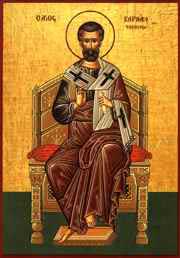
The Matins readings in the Roman Office for the feast are set out below:
Joseph, who by the Apostles was surnamed Barnabas, (which is, being interpreted, the Son of Consolation,) a Levite and of the country of Cyprus, [having land, sold it, and brought the money, and laid it at the Apostles' feet. (Acts iv. 36, 37.) When Paul, after his conversion, was come to Jerusalem, the disciples were all afraid of him, but Barnabas took him, and brought him to the Apostles, (ix. 26, 27,) When tidings that a great number believed and turned unto the Lord at Antioch came unto the ears of the Church which was at Jerusalem, they sent forth Barnabas that he should go as far as Antioch. Who, when he came, and had seen the grace of God, was glad, and exhorted them all that with purpose of heart they would cleave unto the Lord. For he was a good man, and full of the Holy Ghost, and of faith, and much people was added unto the Lord. xi. 21-24.
Then departed Barnabas to Tarsus for to seek Paul, and, when he had found him, he brought him unto Antioch. And it came to pass that a whole year they assembled themselves with the Church, and taught much people. And the disciples were called Christians first in Antioch. And in these days came prophets from Jerusalem unto Antioch. And there stood up one of them, named Agabus, and signified, by the Spirit, that there should be great dearth throughout all the world which came to pass in the days of Claudius Caesar. Then the disciples, every man according to his ability, determined to send relief unto the brethren which dwelt in Judea, which also they did, and sent it to the elders by the hands of Barnabas and Paul. xi. 25-30. And Barnabas and Paul returned from Jerusalem, when they had fulfilled their ministry, and took with them John, whose surname was Mark. xii. 25.
Now there were in the Church that was at Antioch, certain Prophets and teachers and, as Paul and Barnabas, together with them, ministered to the Lord and fasted, the Holy Ghost said Separate Me Barnabas and Saul for the work whereunto I have called them. And when they had fasted and prayed, and laid their hands on them, they sent them away. So they, being sent forth by the Holy Ghost, departed unto Seleucia and from thence they sailed to Cyprus xiii. 1-4 in the which island, and in many other cities and countries, they journeyed about, preaching the Gospel with great gain to them that heard them. Nevertheless, at last, Paul and Barnabas departed asunder one from the other. And so Barnabas took Mark and sailed unto Cyprus, xv. 39, once more. And there it was that upon a certain nth of June, in or about the seventh year of the reign of Nero, Barnabas crowned the dignity of the Apostolate with the glory of martyrdom. During the reign of the Emperor Zeno, his body was found in its grave in Cyprus on his breast lay a copy of the Gospel according to Matthew, written by the hand of Barnabas himself.A cousin of St Mark the Evangelist, St Barnabas may have been one of the seventy disciples sent out to evangelise by Jesus. He was martyred in Cyprus around 61 AD at the hands of a Jewish mob enraged by his preaching in the synagogue. He was dragged out, tortured and then stoned him to death. His kinsman, John Mark, who was a spectator of this barbarous action, privately interred his body.
In 478 Barnabas appeared in a dream to the Archbishop of Constantia (Salamis, Cyprus) Anthemios and revealed to him the place of his sepulchre beneath a carob-tree. The following day Anthemios found the tomb and inside it the remains of Barnabas with a manuscript of Matthew's Gospel on his breast. Anthemios presented the Gospel to Emperor Zeno at Constantinople and received from him the privileges of the Greek Orthodox Church of Cyprus, that is, the purple cloak which the Greek Archbishop of Cyprus wears at festivals of the church, the imperial sceptre and the red ink with which he affixes his signature. Anthemios then placed the venerable remains of Barnabas in a church which he founded near the tomb. Excavations near the site of a present-day church and monastery, have revealed an early church with two empty tombs, believe to be that of St. Barnabas and Anthemios.
An epistle ascribed to Barnabas, though non-canonical is perfectly orthodox and worth reading, though its attribution to him is disputed.
St. Barnabas is venerated as the Patron Saint of Cyprus.
No comments:
Post a Comment